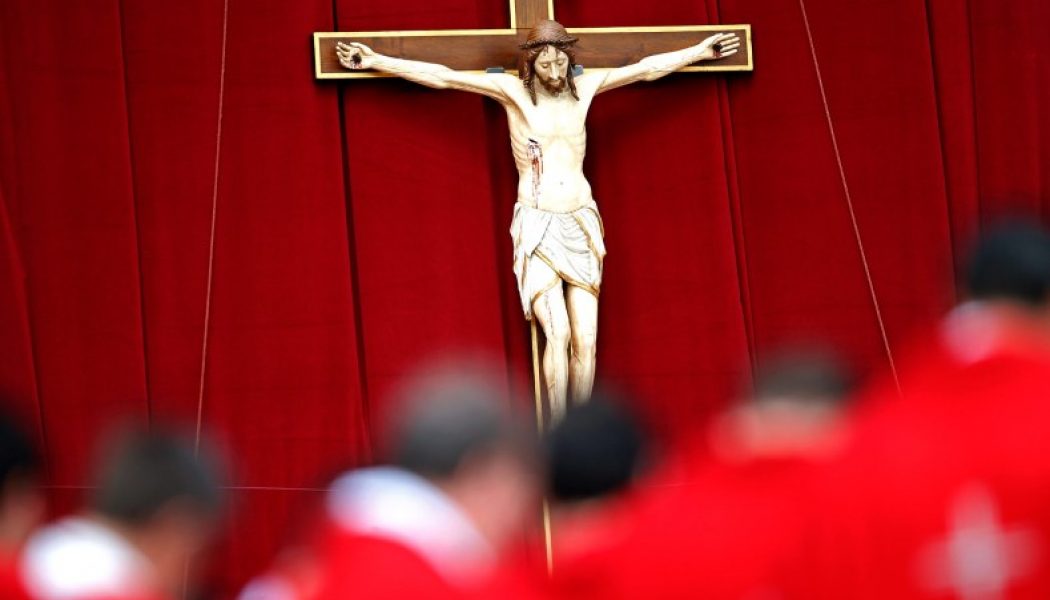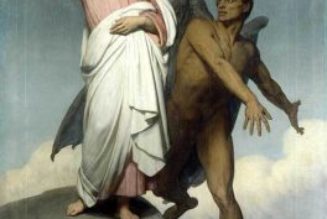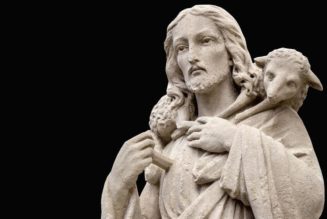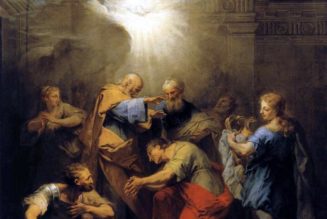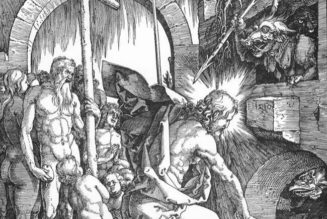
We shouldn’t forget where the idea that we are all equal, unique personalities, each possessed of unfathomable dignity and inviolable rights, came from.
The most important lesson that the study of history teaches us is contingency. Things did not have to turn out the way they did. Take, for instance, the answer that our civilization has historically given to the most important question of all: “What does it mean to be a human being?” Ever since the Enlightenment, many people in the West have had the impression that answering this question is easy, that it’s just a matter of observing human behavior empirically across time and space and then abstracting a few universal maxims from the data. This is our modern faith: that we can read the truth about ourselves in the record of nature the way we read a story in a book.
The seminal example of this is the preamble to the Declaration of Independence, written at the high meridian of the Enlightenment by one of its most incandescent minds:
We hold these truths to be self-evident, that all men are created equal, that they are endowed by their Creator with certain unalienable Rights, that among these are Life, Liberty and the pursuit of Happiness.
For Jefferson, and for us who live today by the light of his words, it’s “self-evident” that “the mass of mankind has not been born, with saddles on their backs, nor a favored few booted and spurred, ready to ride them.” But most people in most places at most times have not thought about human beings like this. The idea that we are all equal, unique personalities, each possessed of unfathomable dignity and inviolable rights, is a rare and relatively parochial one. The world once existed without it (as much of the world still does today) and could easily do so again if we forget where that idea came from and what has sustained it for so long.
We can trace the ancestry of the word “person” back to the ancient Greek word prosopon, which means “mask.” It was used at first in the context of Greek tragedy. Actors wore the physical prosopon of the role they played in a dramatic production. But it soon took on a political and social meaning, especially in Roman society. The Latin word for prosopon is persona, from which our English word is derived. According to the Roman usage, one’s persona was one’s social and legal role within the community. This role varied wildly from one person to the next, from nobleman to senator to shopkeeper to servant, and it didn’t encompass all humans equally the way the word “person” does now. Different social stations were thought almost to be different species, sharing nothing in common, and no one was thought to have any kind of individual existence apart from the role they played in the state. Roman slaves, for instance, were habitually referred to as non habens personam: literally, “not having a person” or “not a person,” because their social functions were so menial and tool-like. Who they actually were as “people” underneath, as we now understand the word, didn’t matter at all.
The Greek dramatic and the Roman political usages of the word have one important thing in common. In neither case is the unique individual who’s behind the mask or who’s playing the social role assigned to him thought to be significant in the least. Metropolitan John Zizioulas puts it like this: “Many writers have represented [ancient] Greek thought as essentially ‘non-personal.’ In its Platonic variation, everything concrete and ‘individual’ is ultimately referred to the abstract idea which constitutes its ground and final justification.”
As they themselves saw it, people in the ancient world really existed only to the extent that they participated in some larger project, whether on the stage or in the city, which constituted their “ground and final justification.” As Zizioulas goes on to write, “identity – that vital component of the concept of man, that which makes one man differ from another, which makes him who he is — [was] guaranteed and provided by the state or by some organized whole.” For this reason, the historian Larry Siedentop writes that in the ancient city, “there was no notion of the rights of individuals against the claims of the city and its gods. There was no formal liberty of thought or action. . . . Citizens belonged to the city, body and soul.” If the individual had any value at all, it was only by reference to some organized collective.
The advent of Christianity overturned this old order of the ages, which had reigned more or less unchallenged since the dawn of civilization until the first Easter morning in Jerusalem some 2,000 years ago. The proclamation of the first Christians — that God had become man — obliterated the conception of personhood that predominated in the ancient world. If Jesus is a “persona,” as the apostolic and patristic fathers of the Church maintained, and he has died and been raised as a representative of the entire race, then we are all more than society and the state would make of us. A gap opens up between our identity and our social obligations. The individual sets foot on the stage of human history for the first time. “There is neither Jew nor Greek, there is neither slave nor free, there is neither male nor female; for you are all one in Christ Jesus.” Or, as Siedentop puts it:
For Paul, belief in the Christ makes possible the emergence of a primary role shared equally by all (“the equality of souls”), while conventional social roles — whether of father, daughter, official, priest or slave — become secondary in relation to that primary role. To this primary role an indefinite number of social roles may or may not be added as the attributes of a subject, but they no longer define the subject. That is the freedom which Paul’s conception of the Christ introduces into human identity.
It’s almost impossible for us to get a real sense of just how earth-shattering the millennia-long aftershock of Easter has been on our civilization. We are all in our moral sensibilities and basic worldview creatures of Christianity to such a great extent that we cannot see it from the vantage point of a pre-Christian society without tremendous imaginative effort. We cannot feel in our bones the farcical, blasphemous lunacy of a criminal, a non habens personam, speaking to a powerful ruler the way that Jesus speaks to Pilate near the climax of John’s gospel. As for the crucifixion itself, the theologian David Bentley Hart is correct when he writes that,
try though we might, we shall never really be able to see Christ’s broken, humiliated, and doomed humanity as something self-evidently contemptible and ridiculous; we are instead, in a very real sense, destined to see it as encompassing the very mystery of our own humanity: a sublime fragility, at once tragic and magnificent, pitiable and wonderful.
The contingency of everything we think decent and valuable about ourselves and our society upon the sorrows and the triumph of this one man, in whose luminous shadow we have all lived for the last 2,000 years, consistently eludes us. We forget that in a historically demonstrable way, we in the West owe our sense of common universal humanity entirely to Jesus of Nazareth and his Church. Even the smallest details of the Easter story, like the tears of St. Peter after his betrayal of Jesus, signal the radical discontinuity of the Christian revolution from what came before to an extent that we’re utterly blind to today. As Hart movingly points out:
What is obvious to us — Peter’s wounded soul, the profundity of his devotion to his teacher, the torment of his guilt, the crushing knowledge that Christ’s imminent death forever foreclosed the possibility of seeking forgiveness for his betrayal — is obvious in very large part because we are the heirs of a culture that, in a sense, sprang from Peter’s tears. To us, this rather small and ordinary narrative detail is unquestionably an ornament of the story, one that ennobles it, proves its gravity, widens its embrace of our common humanity. In this sense, all of us — even unbelievers — are “Christians” in our moral expectations of the world. To the literate classes of late antiquity, however, this tale of Peter weeping would more likely have seemed an aesthetic mistake; for Peter, as a rustic, could not possibly have been a worthy object of a well-bred man’s sympathy, nor could his grief possibly have possessed the sort of tragic dignity necessary to make it worthy of anyone’s notice. . . . This is not merely a violation of good taste; it is an act of rebellion.
As Siedentop recounts in Inventing the Individual: The Origins of Western Liberalism, the intervening centuries between the first Easter and today have seen a long, uneven, and imperfect effort to translate the Christian belief in universal human dignity into social and political realities. Contrary to what the enemies of Christianity allege, the Enlightenment was much less of a break with what preceded it and much more indebted to centuries of Christian moral osmosis: It was not a sudden kickstart of reason after ages of enforced ignorance. The scholar Brian Tierney notes that already by 1300 a number of rights were regularly claimed and defended on the basis of the Christian understanding of personhood: “They would include rights to property, rights of consent to government, rights of self-defence, rights of infidels, marriage rights, procedural rights,” and also measures to make these rights enforceable against positive law. To the extent that we see ourselves as rights-bearing individuals with real responsibilities, we are all cultural artifacts of Easter.
The long cultural aftershock of the resurrection of the Son of God seems to be receding in the West, however, as suggested by surveys of American religious habits. Just last week, Gallup released a new study showing that church membership in the United States has fallen below 50 percent for the first time. Even without hard data as evidence, it would be possible to infer as much from the state of American society and politics. We are increasingly moving toward a way of dealing with each other that looks more like the pagan culture that Christianity supplanted than anything else. Zizioulas described pagan society as a “non-personal” one in which the individual “is ultimately referred to the abstract idea which constitutes its ground and final justification.” In America today, individuals are ultimately referred to the abstract political idea that constitutes their “ground and final justification” in the social order.
We see each other increasingly as flattened-out avatars of abstract collectives from which we derive our sense of solidity and meaning. We are Republicans, Democrats, anti-maskers, anti-vaxxers, pro-lifers, pro-choicers. The unique and unrepeatable person that lies buried underneath all of these labels, the pre-political person that Jesus delivered to each of us upon the cross, is being crowded out and suffocated. Furthermore, we have no reason to believe it will survive our cultural abandonment of the faith that brought it to birth. We do have this consolation, though: that even if this primacy of personhood is in its death throes in the West, it will find its way out of the grave again. None of our failures, whether personal or political, can slow the arrival of that shining city to come, where Christ reigns untouched by the ravages of time, forever ancient and forever new.
Join Our Telegram Group : Salvation & Prosperity
